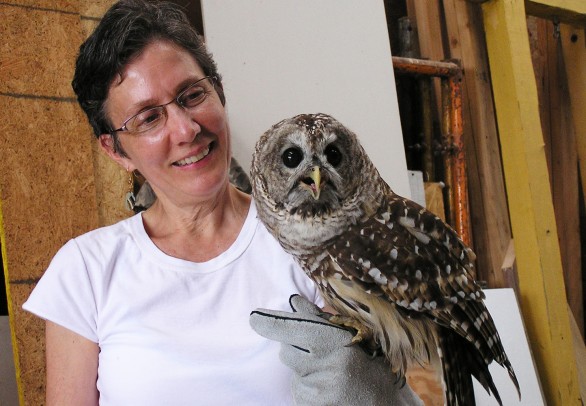Raptor rescuer takes injured birds under wing

Social work staff member Maria Carrasco, with a barred owl, volunteers with the Ojai Raptor Center in California. “It’s very fulfilling to be able to nurse them back to health, and wonderful to release them back into the wild,” she says. “It’s the least I can do — that’s my contribution.”
Maria Carrasco’s work with owls and other raptors can be traced to the 210 million-gallon BP oil spill in 2010.
Carrasco, a staff member in the Jane Addams College of Social Work, volunteered to go to the Gulf of Mexico to help clean the birds coated by oil.
After she was turned down because she wasn’t a licensed bird rehabilitator, she signed up for training at the Ojai Raptor Center in Ojai, Calif.
Now she returns there regularly to volunteer.
Her duties include assisting with medical examinations — taking a bird out of its cage and holding it while it’s treated.
“You have to grab tight and never let go,” she said. “The birds make this hissing sound.”
When a bird is too weak to eat, Carrasco puts a feeding tube down its throat.
With an injured bird, she swabs down the wound or wraps the damaged part.
She feeds frozen or live rats to the raptors.
“The live rats are used for training for birds that are going back to the wild,” Carrasco said. “You put the rat in a box with the bird and see if it can catch it.”
She also cleans cages and replenishes food and water.
A bird that won’t make it in the wild must be euthanized. “That’s hard,” Carrasco said.
She’s cared for barred owls, barn owls, falcons, red-tailed hawks, golden eagles, bald eagles, red-shouldered hawks and great horned owls.
Of the latter, she said, “They’re very powerful — their claws could probably crush your hand bone. I don’t try to pet them.”
Of the red-shouldered hawks, she said, “I had the honor to release one on my last day at Ojai.
“It’s very fulfilling to be able to nurse them back to health, and wonderful to release them back into the wild,” Carrasco said. “It’s the least I can do — that’s my contribution.”
In her office, she has photos of raptors on the wall behind her computer. On top of a filing cabinet is a bowl filled with feathers she’s found on walks around campus, including ones from Rosie, UIC’s resident peregrine falcon, and her mate.
Carrasco is assistant to the director for field instruction in the Jane Addams College of Social Work.
She handles paperwork for master’s degree students doing their internships. Her office has placed about 300 students with 252 agencies.
She also works with field instructors.
“They supervise the social work intern in the field, where theory and practice come together,” she said. “The field instructor evaluates that the student is meeting the competencies expected in his or her area of study.”
Some of the field instructors are UIC grads.
“When they get placed, they contact us so they can set up the internship program and monitor students,” she said.
She also organizes events such as workshops and an annual field instructors’ breakfast.
Carrasco started out in what is now the Lakeview neighborhood, moving to Ecuador — where her diplomat father is from — when she was 2 or 3.
The family returned to Chicago when she was 9 or 10, moving from there to Baton Rouge, La.
She pursued secretarial work after high school and started her studies at UIC when she was in her 30s.
After earning a bachelor’s degree she taught English as a second language at Truman College from 1998 to 2003, when she joined UIC.
Until 2006, Carrasco was assistant to the associate dean, then left to help with her mother’s health issues for a couple of years before returning.
She lives in Rogers Park with her husband, Mario Quesada, office manager at the Center for Neighborhood Technology.
Carrasco enjoys hiking and birding. She has also volunteered at the Peggy Notebaert Nature Museum in Lincoln Park, replenishing food for birds in the butterfly exhibit — nectar for honeycreepers, chopped fruits and greens for other songbirds, and a dry kibble for button quail.
She loves the birds she watches and cares for, and feels a responsibility towards them.
“We are stewards of the earth,” she said. “It’s important for us to preserve and protect the birds.
“They’re so free. To see them soaring in the sky, the freedom of flight — they are just beautiful creatures.”
gwisby@uic.edu
